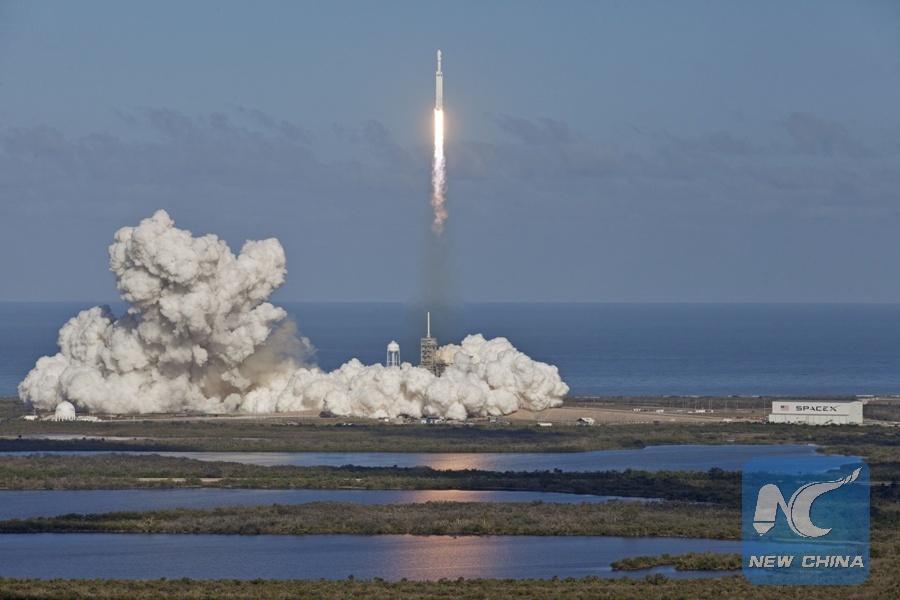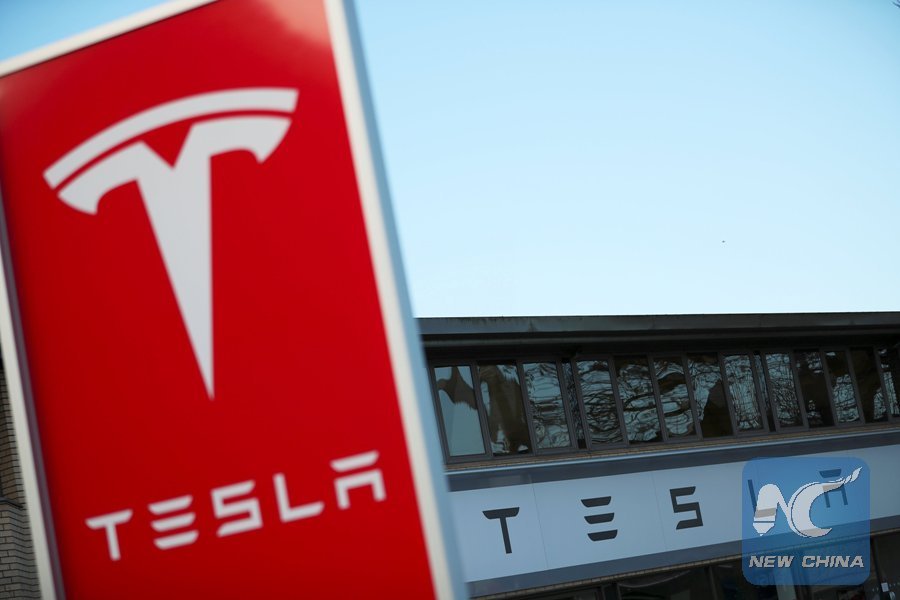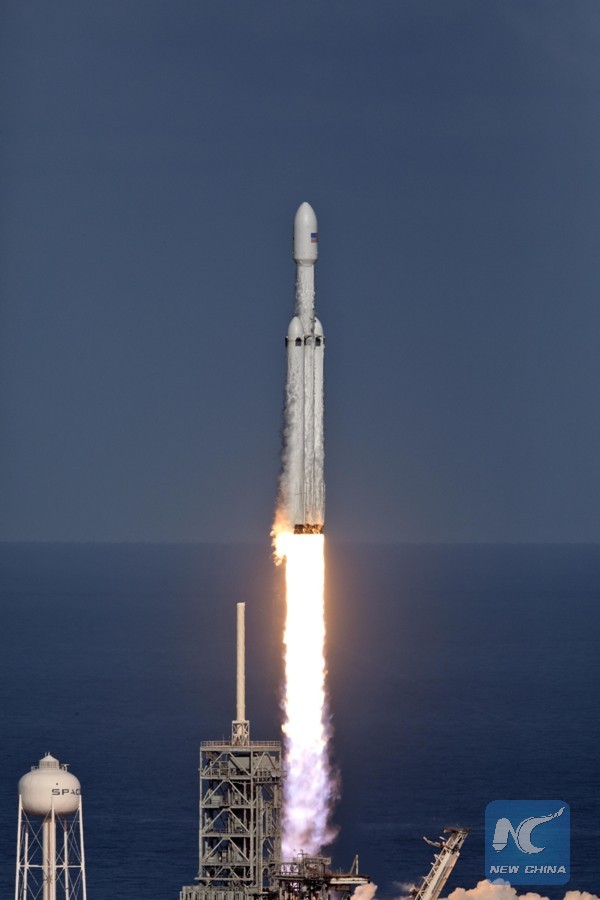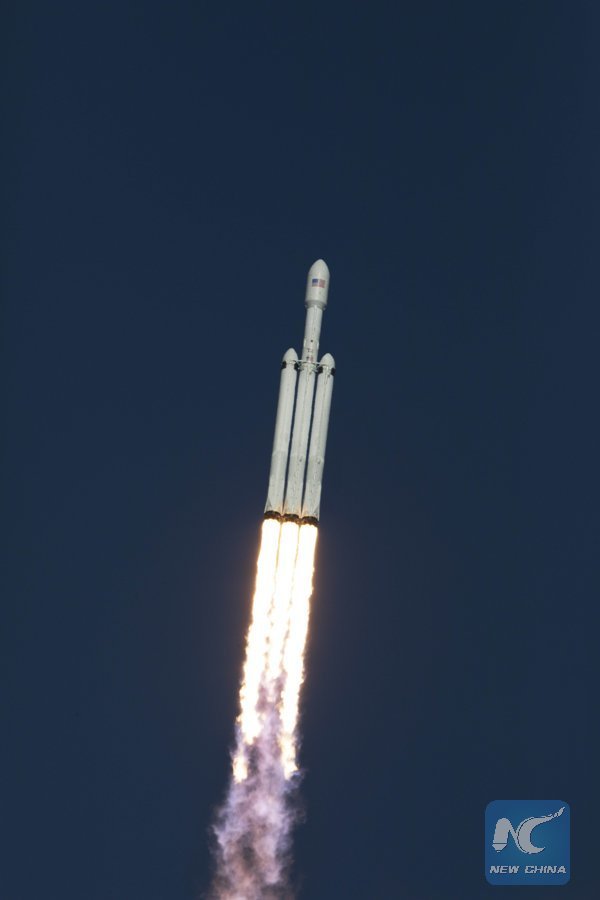
A SpaceX Falcon Heavy rocket lifts off from Florida's Kennedy Space Center, the United States, Feb. 6, 2018. (Xinhua/NASA)
WASHINGTON, Feb. 7 (Xinhua) -- A red Tesla sports car is now on its way toward a Mars-adjacent orbit by the worlds's most powerful operational rocket Falcon Heavy launched Tuesday.
"Third burn successful. Exceeded Mars orbit and kept going to the Asteroid Belt," Elon Musk, SpaceX and Tesla founder, tweeted about seven hours after the liftoff.
Falcon Heavy blasted off at 3:45 p.m. EST (2145 GMT) from the Kennedy Space Center where American space agency NASA launched a rocket that sent astronauts to the moon in 1969.

A Tesla dealership is seen in West Drayton, just outside London, Britain, February 7, 2018. (Xinhua/REUTERS)
The rocket's two side boosters landed simultaneously back on ground eight minutes after the liftoff, bringing loud cheers and ovations among about 10,000 viewers on the spot.
SpaceX's Falcon Heavy is essentially three of the company's Falcon 9 rockets bolted together. With a total of 27 Merlin engines, it is capable of generating "more than 5 million pounds (2.3 million kg) of thrust at liftoff, equal to about eighteen 747 aircraft," according to SpaceX.
DON'T PANIC!
Musk said in a news conference after the launch that it looked "so ridiculous and impossible, and you can tell it's real because it looks so fake."
"You can tell it's real because it looks so crazy because the colors, all that kind of weird in space," Musk said, celebrating his accomplishment.
He tweeted a live view of the dummy driver who was installed in the car seat and looked back at our blue planet from which he departed forever.
In front of him a screen read "Don't panic." On the circuit board of a car was printed "Made on Earth by Humans."
According to Musk, the car will get about 400 million km away from the Earth months later if it goes as planned and will run at 11 km per second.
"The mission went as well as one could hope," said Musk, "it's the most exciting thing I've ever seen," although he said the rocket's central core failed to fall on the drone ship in the Atlantic as planned, and hit the water nearby.
NASA's Acting Administrator Robert Lightfoot said, "All of us in this business know the effort it takes to get to a first flight of any new vehicle and recognize the tremendous accomplishment we witnessed today."
Before the launch, Musk has played down expectations for the launch, saying that the mission might end in a "firework display."
"When I see the rocket left off, I see a thousand things that could not work and it's amazing when they do," he said.
DESTINATION: MARS
The Falcon Heavy launch is a game-changer to the heavy-lift rocket industry. It can lift 64 tons of goods into orbit, doubling the lift capacity of the next closest operational vehicle, the Delta IV Heavy, at one-third the cost, the company said.
Only the Saturn V moon rocket, last flown in 1973, delivered more payloads to orbit.

A SpaceX Falcon Heavy rocket lifts off from Florida's Kennedy Space Center, the United States, Feb. 6, 2018. (Xinhua/NASA)
"An operational Falcon Heavy will make SpaceX the proud owner of the most powerful rocket system since the Saturn V, and opens up yet another corner of the launch industry to serious competition," said Jason Davis of the Planetary Society, U.S. largest nonprofit organization that promotes space exploration.
"We're able to offer arguably super-heavy-lift, or nearly super-heavy-lift capability, for not much more than a Falcon 9," said Musk.
NASA and some other American private companies including Amazon founder Jeff Bezos's Blue Origin are also developing their own heavy-lift rockets, but Musk's cost-effective huge booster is now in the lead.
Also, the rocket's maiden voyage is believed to bring deep space exploration closer.

A SpaceX Falcon Heavy rocket lifts off from Florida's Kennedy Space Center, the United States, Feb. 6, 2018. (Xinhua/NASA)
"The Falcon Heavy is definitely capable of sending the crewed vehicle around the moon," said Musk, suggesting an improved version of the rocket will be "ideal for interplanetary colonization and for establishing a large base on the moon and a city on Mars."
The Falcon Heavy is a "prelude" and "going to teach us a lot about what's necessary to have a huge booster with a crazy number of engines," the tech billionaire said.

